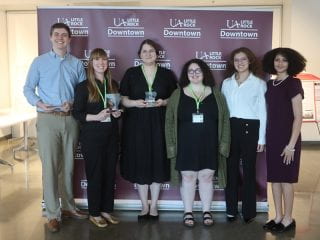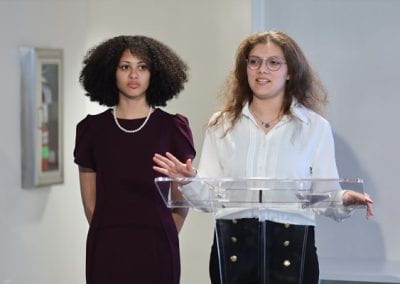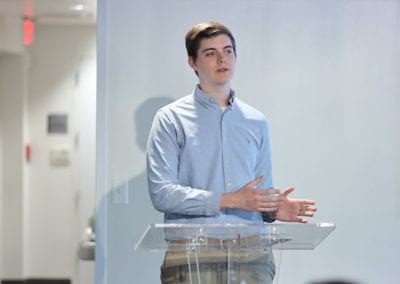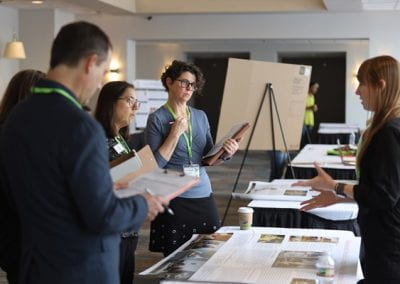U of A Humanities Students Take Top Honors in State Competition

Hank Herzfeld (left), Jessie Brown (second to left), Celina Sabillon (far right), Alexa Rodan (second to right).
LITTLE ROCK, Ark. – U of A students scored big in the Next Gen(eration) Humanities Conference poster competition in Little Rock earlier this month, winning first and second place along with honorable mention. Every U of A student who attended the conference received recognition.
The Next Gen(eration) Humanities Conference was sponsored by the National Endowment for the Humanities and the Arkansas Humanities Council and was organized by honors alumna Jamie Middleton (B.A.’18), program officer for grants and public programs at the Arkansas Humanities Council.
Shelly C. Lowe, the director of the National Endowment for the Humanities, also attended with representatives from humanities organizations from across the nation. Throughout the conference, undergraduates and recent graduates in the humanities attended panels on how to bridge the transition from school to a career in the humanities.
Students in the poster fair won the following awards for the projects listed below:
First Place
- Jessie Brown, master’s student in comparative literature and cultural studies
“Adaptation and Coloniality in Henry Moore’s Reclining Figures”
Adviser: Ana Pulido Rull, endowed associate professor of art history and Latin American and Latino studies
Second Place
- Hank Herzfeld, Bodenhamer fellow and honors history and political science major
“Remembering the Stasi on the Screen: Historical Memory Film Analysis of the East German Ministry for State Security”
Adviser: Laurence Hare, associate professor of history and director for undergraduate excellence and global engagement
Honorable Mention
- Honors Path Scholars Alexa Roldan, political science major, and Celina Sabillon, history and political science major, representing their Honors Arkansas forum, Voting Rights, including: Joseph Dumond, Elizabeth Gunderman and Emma Mitchell
“Hub for Student Voters: Increasing Voter Participation among Students at the University of Arkansas, Fayetteville”
Advisers: Angie Maxwell, professor of political science and director of the Diane D. Blair Center for Southern Politics and Society; Jennie Popp, professor of agricultural economics and agricultural business and associate dean of the Honors College; and Louise Hancox, senior director of the Honors Futures Hub
Students were judged on their posters’ detail and communication style, research presentation pitch, the originality and rigor of their projects and extemporaneous responses.
Judges included:
- Jeremy Ecke, interim associate dean of the College of Humanities, Arts, Social Sciences and Education at the University of Arkansas at Little Rock
- Phoenix Smithey, head of Special Collections at the University of Central Arkansas
- Tricia Starks, distinguished professor of history and director of the University of Arkansas Humanities Center in Fayetteville
- Mel Zebecki State, state archaeologist at the Arkansas Archeological Survey
About the University of Arkansas Humanities Center: The University of Arkansas Humanities Center, in the Fulbright College of Arts and Sciences, promotes cross-disciplinary research and inquiry in the humanities, sponsors programs that engage humanities scholars and the wider public in conversations about critical topics, and fosters a strong role for the humanities in an increasingly global society.
About the Honors College: The University of Arkansas Honors College was established in 2002 and brings together high-achieving undergraduate students and the university’s top professors to share transformative learning experiences. Each year the Honors College awards up to 90 freshman fellowships that provide $80,000 over four years, and more than $1 million in undergraduate research and study abroad grants. The Honors College is nationally recognized for the high caliber of students it admits and graduates. Honors students enjoy small, in-depth classes, and programs are offered in all disciplines, tailored to students’ academic interests, with interdisciplinary collaborations encouraged. All Honors College graduates have engaged in mentored research.
About the University of Arkansas: As Arkansas’ flagship institution, the U of A provides an internationally competitive education in more than 200 academic programs. Founded in 1871, the U of A contributes more than $2.2 billion to Arkansas’ economy through the teaching of new knowledge and skills, entrepreneurship and job development, discovery through research and creative activity while also providing training for professional disciplines. The Carnegie Foundation classifies the U of A among the few U.S. colleges and universities with the highest level of research activity. U.S. News & World Report ranks the U of A among the top public universities in the nation. See how the U of A works to build a better world at Arkansas Research and Economic Development News.
This story also appeared in the University of Arkansas News publication.





